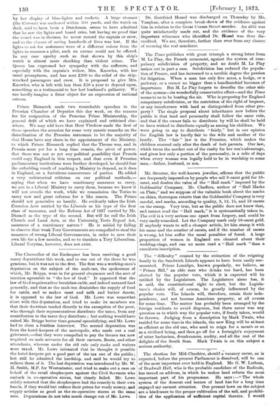Prince Bismarck made two remarkable speeches in the Prussian Chamber
of Deputies this day week, on the reasons for his resignation of the Prussian Prime Ministership, the general drift of which we have explained and criticised else- where. We may add here that Herr Vircliow made the first of these speeches the occasion for some very caustic remarks on the disinclination of the Prussian statesman to let the majority of that House have any share in the appointment of the Ministry, to which Prince Bismarck replied that the Throne was, and in Prussia must yet for a long time remain, the pivot of power, that there was not as yet any political possibility that Prussia could copy England in this respect, and that even if Prussian parliamentary institutions were further developed, he should fear the enfeebling result of teaching a Ministry to depend, as it does in England, on a fortuitous concurrence of parties. He added a very unhistorical criticism on our political methods,— saying that when we have reactionary measures to carry, we put in a Liberal Ministry to carry them, because we know it will not overdo the work, while we commission the Tories to carry new and great reforms for a like reason. The Prince should not generalise so hastily. He evidently takes the Irish Coercion Acts carried by the Liberals as his type of the first class of measures, and the Reform Act of 1867 carried by Mr. Disraeli as the type of the second. But will he call the Irish Church and Land Acts, or the University_ Tests Repeal Act, measures of a reactionary nature ? He is misled by failing to observe that weak Tory Governments are compelled to steal the measures of strong Liberal Governments, in order to save their own life for a few months, and so to simulate a Tory Liberalism. Liberal Toryism, however, does not exist.






































 Previous page
Previous page